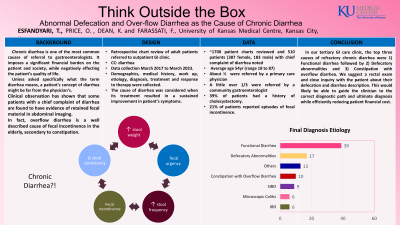Monday Poster Session
Category: Functional Bowel Disease
P1951 - Think Out of the Box: Abnormal Defecation and Overflow Diarrhea as the Cause of Chronic Diarrhea
Monday, October 23, 2023
10:30 AM - 4:15 PM PT
Location: Exhibit Hall

- TE
Tuba Esfandyari, MD, MSc, MSCR
University of Kansas Medical Center
Kansas City, Kansas
Presenting Author(s)
Tuba Esfandyari, MD, MSc, MSCR1, Olivia Price, MS, CCRP1, Katie Dean, MS1, Fatemeh S. Farassati, 2
1University of Kansas Medical Center, Kansas City, KS; 2University of Kansas, Kansas City, KS
Introduction: Chronic diarrhea is one of the most common causes of referral to gastroenterologists. It imposes a significant financial burden on patient and society as well as a negative effect on the patient’s quality of life. Chronic diarrhea could mean increased stool weight, change in stool consistency, fecal urgency, increased frequency or merely an episode of fecal incontinence. Unless asked specifically what the term diarrhea means, a patient's concept of diarrhea might be far from the physicians. Clinical Observation has shown that some patients with chief complaint of diarrhea are found to have evidence of retained fecal material in abdominal imaging. In fact, overflow diarrhea is a well described cause of fecal incontinence in elderly secondary to constipation.
Methods: Medical records of adults referred to outpatient GI clinic at Kansas University Medical center from 3/1/2023- 3/1/2023 were reviewed, retrospectively. Data on patients’ demographics, medical history, work up, etiology, treatment and response were collected. The cause of diarrhea was considered when its treatment has resulted in a sustained improvement in patient’s symptoms.
Results: Total of 510 patients (387 female, 183 male), average age 54 y.o. (range 18 to 87) were referred by a primary care physician 52%, or a community gastroenterologist 37% or others 11%. 39% of patients had a history of cholecystectomy. 21% of patients reported episodes of fecal incontinence.
The most common completed tests were colonoscopy 83%, stool studies 75%, EGD 72%, abdominal cross-sectional imaging 45%, neuroendocrine markers 38%, anorectal function tests 25% and hydrogen breath test 17%.
The final diagnosis was reached in 89% of patients. The most common cause of chronic diarrhea was functional 39%, followed by defecatory abnormalities 17%, constipation with overflow diarrhea 10%, SIBO 9%, microscopic colitis 6%, , IBD 6%, post-surgical 3%, pancreatic insufficiency 2%,. medication-induced 2%, lactose intolerance 2%, bile induced diarrhea 2%, celiac disease 1%, neuroendocrine tumor 1%.
Discussion: After functional diarrhea, abnormal defecatory disorders and constipation with overflow diarrhea are common causes of chronic diarrhea in this cohort of patients referred to our tertiary care GI clinic. We suggest a rectal exam and close inquiry about defecation and the diarrhea description would likely be able to guide clinician to the correct diagnostic path, reducing the financial cost and reaching the correct diagnosis in an efficient way.
Disclosures:
Tuba Esfandyari, MD, MSc, MSCR1, Olivia Price, MS, CCRP1, Katie Dean, MS1, Fatemeh S. Farassati, 2. P1951 - Think Out of the Box: Abnormal Defecation and Overflow Diarrhea as the Cause of Chronic Diarrhea, ACG 2023 Annual Scientific Meeting Abstracts. Vancouver, BC, Canada: American College of Gastroenterology.
1University of Kansas Medical Center, Kansas City, KS; 2University of Kansas, Kansas City, KS
Introduction: Chronic diarrhea is one of the most common causes of referral to gastroenterologists. It imposes a significant financial burden on patient and society as well as a negative effect on the patient’s quality of life. Chronic diarrhea could mean increased stool weight, change in stool consistency, fecal urgency, increased frequency or merely an episode of fecal incontinence. Unless asked specifically what the term diarrhea means, a patient's concept of diarrhea might be far from the physicians. Clinical Observation has shown that some patients with chief complaint of diarrhea are found to have evidence of retained fecal material in abdominal imaging. In fact, overflow diarrhea is a well described cause of fecal incontinence in elderly secondary to constipation.
Methods: Medical records of adults referred to outpatient GI clinic at Kansas University Medical center from 3/1/2023- 3/1/2023 were reviewed, retrospectively. Data on patients’ demographics, medical history, work up, etiology, treatment and response were collected. The cause of diarrhea was considered when its treatment has resulted in a sustained improvement in patient’s symptoms.
Results: Total of 510 patients (387 female, 183 male), average age 54 y.o. (range 18 to 87) were referred by a primary care physician 52%, or a community gastroenterologist 37% or others 11%. 39% of patients had a history of cholecystectomy. 21% of patients reported episodes of fecal incontinence.
The most common completed tests were colonoscopy 83%, stool studies 75%, EGD 72%, abdominal cross-sectional imaging 45%, neuroendocrine markers 38%, anorectal function tests 25% and hydrogen breath test 17%.
The final diagnosis was reached in 89% of patients. The most common cause of chronic diarrhea was functional 39%, followed by defecatory abnormalities 17%, constipation with overflow diarrhea 10%, SIBO 9%, microscopic colitis 6%, , IBD 6%, post-surgical 3%, pancreatic insufficiency 2%,. medication-induced 2%, lactose intolerance 2%, bile induced diarrhea 2%, celiac disease 1%, neuroendocrine tumor 1%.
Discussion: After functional diarrhea, abnormal defecatory disorders and constipation with overflow diarrhea are common causes of chronic diarrhea in this cohort of patients referred to our tertiary care GI clinic. We suggest a rectal exam and close inquiry about defecation and the diarrhea description would likely be able to guide clinician to the correct diagnostic path, reducing the financial cost and reaching the correct diagnosis in an efficient way.
Disclosures:
Tuba Esfandyari indicated no relevant financial relationships.
Olivia Price indicated no relevant financial relationships.
Katie Dean indicated no relevant financial relationships.
Fatemeh Farassati indicated no relevant financial relationships.
Tuba Esfandyari, MD, MSc, MSCR1, Olivia Price, MS, CCRP1, Katie Dean, MS1, Fatemeh S. Farassati, 2. P1951 - Think Out of the Box: Abnormal Defecation and Overflow Diarrhea as the Cause of Chronic Diarrhea, ACG 2023 Annual Scientific Meeting Abstracts. Vancouver, BC, Canada: American College of Gastroenterology.
